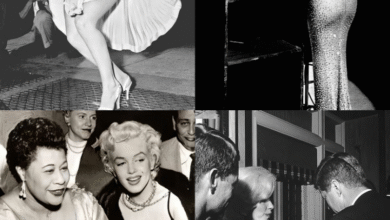Jennifer Lawrence Shares How She Conquered Anxiety — And How She’s Helping Others Break the Stigma!
OPINION: This article may contain commentary which reflects the author's opinion.
Jennifer Lawrence, the Oscar-winning actress known for her iconic roles in The Hunger Games and Silver Linings Playbook, has been refreshingly open about her personal struggles with mental health, particularly anxiety. Her candid discussions about her battles with the condition have made a significant impact, helping to destigmatize mental health issues and encouraging others to share their experiences.
Early Struggles and Diagnosis
Lawrence’s struggles with anxiety began in her childhood. In interviews, she has described experiencing social anxiety and hyperactivity at an early age, behaviors that led to her earning the nickname “Nitro” during her school years due to her energetic and often restless nature. While she initially sought help from a psychologist, Lawrence found that traditional therapy didn’t provide the relief she needed at the time.
It wasn’t until she discovered acting that she began to feel a sense of control over her emotions. In a 2015 article with Mic, Lawrence described acting as a form of self-therapy, an outlet that allowed her to process her anxiety in a way that felt natural and fulfilling. For Lawrence, acting became more than a career—it was a means of understanding herself, giving her a sense of capability and happiness that contrasted sharply with the earlier feelings of worthlessness she had struggled with.
Coping Mechanisms and Management
As Lawrence’s career took off, managing her mental health became increasingly important. In addition to acting, she has openly discussed using medication, including Prozac and Xanax, to manage her anxiety. Her approach to coping also involves keeping her public and private personas separate. By compartmentalizing her life, she’s been able to reduce the overwhelming pressures of fame that could otherwise exacerbate her anxiety.
Furthermore, Lawrence embraces the power of mundane tasks, citing activities like picking up dog poop as ways to stay grounded and relieve stress. In an interview with bpHope in 2018, she emphasized the importance of self-care, mindfulness, and knowing when to take breaks. Her strong support network, including close friends and family, has also played a pivotal role in her ability to stay resilient, especially in the face of industry pressures.
Burnout and Career Reflections
Lawrence has candidly discussed the burnout she experienced after the success of The Hunger Games and winning the Oscar for Silver Linings Playbook. In several interviews, she reflected on feeling as though she had lost control of her career and the decisions she was making. This sense of overwhelm led her to take a career hiatus between the 2019 release of Dark Phoenix and the 2021 film Don’t Look Up. The break allowed Lawrence to step back and reassess her priorities, ultimately helping her regain a healthier balance between her career and personal life.
Public Discussions and Impact
Jennifer Lawrence’s willingness to openly discuss her mental health struggles has been transformative for both her career and her fans. Her openness in interviews, such as those with Madame Figaro in 2013, The New York Times in 2015, and bpHope in 2018, has contributed to reducing the stigma surrounding mental health. By sharing her experiences, she has encouraged others to come forward with their own struggles, fostering a sense of solidarity among those dealing with anxiety and other mental health issues.
According to the National Institute of Mental Health (NIMH), approximately 18% of the adult U.S. population lives with ongoing anxiety, with many turning to prescription medications such as Prozac or Xanax for help. Lawrence’s transparency about her journey with anxiety resonates with millions, as her openness provides a sense of validation and hope for those who may be experiencing similar challenges.
Breaking the Stigma
The stigma surrounding mental health, particularly anxiety, remains a significant barrier for many individuals seeking help. As highlighted by Mental Health WA, the social stigma attached to mental illness often prevents people from speaking out and seeking the support they need. Jennifer Lawrence’s courage in sharing her own struggles serves as a beacon for those who may feel isolated or misunderstood in their own experiences.
Her willingness to be vulnerable about her mental health has not only helped break down these barriers but also contributed to the broader conversation about mental well-being, both in the entertainment industry and beyond.
Conclusion
Jennifer Lawrence’s journey with anxiety has been one of resilience, growth, and openness. By embracing her struggles, sharing her coping mechanisms, and speaking candidly about her experiences, she has become a powerful advocate for mental health awareness. As she continues to navigate her career and personal life, her story serves as a reminder that even those who seem to have it all face personal battles—and that it’s okay to ask for help. Her influence is undeniable, and her commitment to destigmatizing mental health issues continues to inspire fans around the world.



